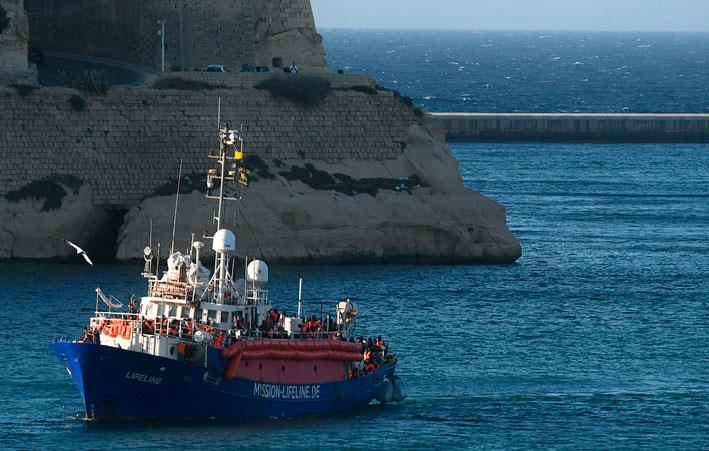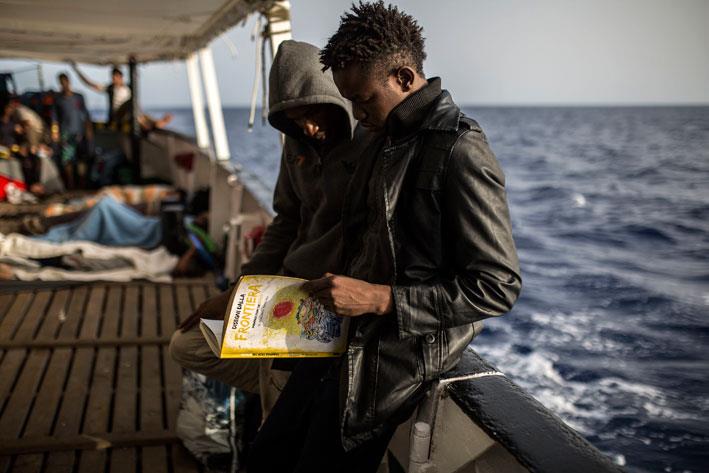The rise of an anti-migrant populist coalition, composed of two parties at opposite ends of the political spectrum, has seen the Mediterranean become the centre of diplomatic issues concerning migration, with the Italians showing open hostility to the current status quo and international obligations.
Malta has been steadfast in standing its ground on the issue, with Prime Minister Muscat employing aggressive tactics in the face of growing tensions, blocking NGOs from entering or exiting Maltese ports, grounding an NGO’s spotter plane and only accepting the entry of a vessel on the establishment of an ad-hoc agreement ensuring the relocation of the migrants between eight European states.
Muscat’s actions, while certainly having the support of the still anti-migrant population, have raised concerns over whether the country is acting in accordance with the law, so The Malta Independent on Sunday spoke with Dr Larry Gauci, an expert on maritime law, to gain a further perspective on the issue.
Gauci’s overarching belief is that the United Nations Convention on the Law of the Sea (UNCLOS) allows Malta to express its sovereignty over the decision to close the ports to NGO vessels. The convention, which establishes a country’s sovereignty within its territorial waters and ports, states that port access is not within the scope of the international law of the sea, but falls under the sovereignty of a state, meaning that the closure of ports for the entry and/or exit of vessels will be governed by national law.
According to sources within the EU Commission, in international and European maritime law there is a section entitled ‘Port State Control’. Gauci explained that, while he believed that UNCLOS was more relevant to the current situation, national authorities have the right to inspect non-national vessels calling at their ports and verify their safe operation and if there is a problem, declare their ports closed to a particular vessel.
These issues can range from technical considerations to problems with documentation and/or certification.

The Aquarius
The first instance that raised diplomatic tension in the Mediterranean concerned the a vessel owned by the NGO ‘Doctors Without Borders (Médecins Sans Frontières – MSF), the Aquarius. This vessel, which had rescued 629 migrants within Libyan territorial waters, was refused entry by both Malta and Italy, with Spain agreeing to take in the migrants.
Given that the vessel was located closer to Lampedusa, it was Italy that was legally obliged to take in the migrants, not Malta. Prime Minister Muscat stuck to this line, at one point saying that if Malta had been legally obliged to accept the vessel, it would have done so.

Lifeline and Sea-Watch
The stand-off with MV Lifeline, an NGO-owned vessel, came after both Italy and Malta refused to allow it to dock and take responsibility for the migrants after the vessel ignored orders to return the migrants to Libya.
The stalemate was eventually broken after eight EU countries including Malta entered into an ad hoc agreement, promising to take a share of the migrants on board.
Lifeline Captain Claus-Peter Reisch, 57, born in Munich, Germany, has since been charged with entering Maltese territorial waters illegally without proper registration or a licence. The prosecuting officers are also requesting that the court orders the confiscation of the vessel.
Sources explained that Lifeline, which the court has declared is a stateless vessel, exists through a loophole in Dutch legislation.
In the Netherlands, a vessel may be registered under a public registry as is the case in Malta, but it may also be registered through a yacht club. This is in order to cater for the many canal and river boats that exist around the country. There is a precedent in Malta to block such vessels, as the authorities appear to only recognise those registered in the public registry.

Since then, a vessel belonging to Sea-Watch International has also been detained in Malta. A spotter plane, which is key to finding sinking migrant boats, has also been barred from taking off, with a government spokesperson saying that Malta’s Search and Rescue authority had not requested any surveillance missions by third parties to be conducted within its SRR and FIR.
Gauci explained that in Malta, in a situation such as the one regarding Lifeline, the country is able to exercise its sovereignty over its ports.
The EU Council has vocally backed Muscat’s decision, with Council President Donald Tusk making special reference to it in his speech following the council meeting last week
In a statement, the group said that the lack of permission to sail from Malta would appear to be not a registration issue, but a political campaign to stop civil rescue at sea.
A Dutch investigator has been sent to Malta to examine the situation.

Legal concerns and moral issues
Former Prime Minister Lawrence Gonzi told this newsroom that it is crucial to “remind everybody that it is the value of every human life that concerns us. These [asylum-seekers] are very vulnerable people, they are probably the weakest of the lot, and we have an ethical, moral and legal duty to make saving lives our first priority and then take it from there.”
Figures resoundingly show that the number of migrant crossings continues to fall significantly. This is due in part to the EU’s work in Turkey (which currently accommodates the most asylum seekers, at five million) and the EU Council’s proposal to create disembarkation points which will certainly ease pressure over potential diplomatic issues while, as has been shown, ad-hoc agreements can be agreed with the help of a number of willing states, including Spain, France, Germany, Portugal, Belgium, the Netherlands and Norway.